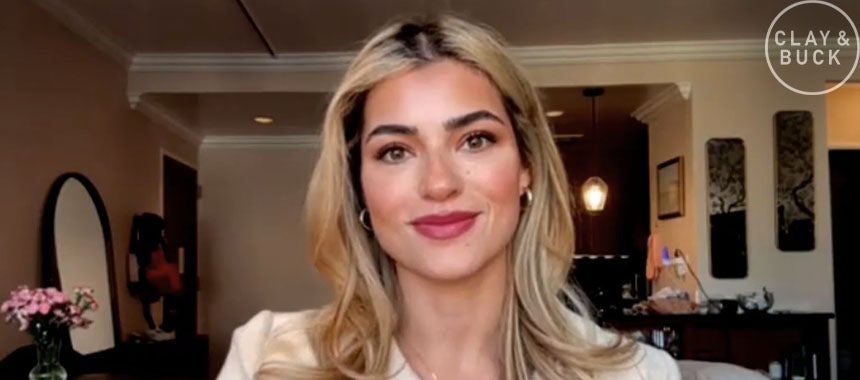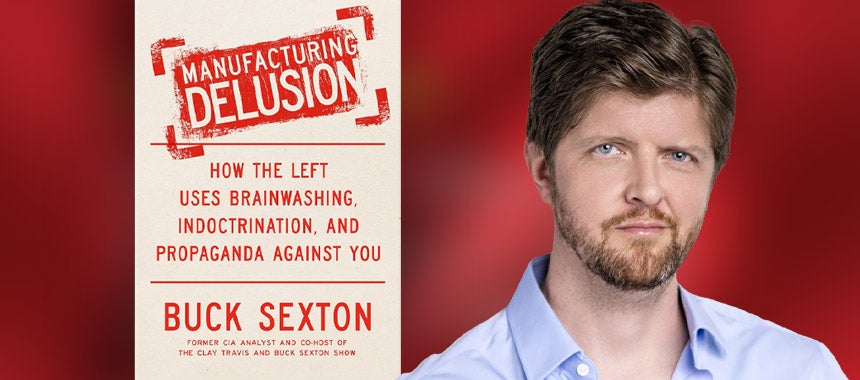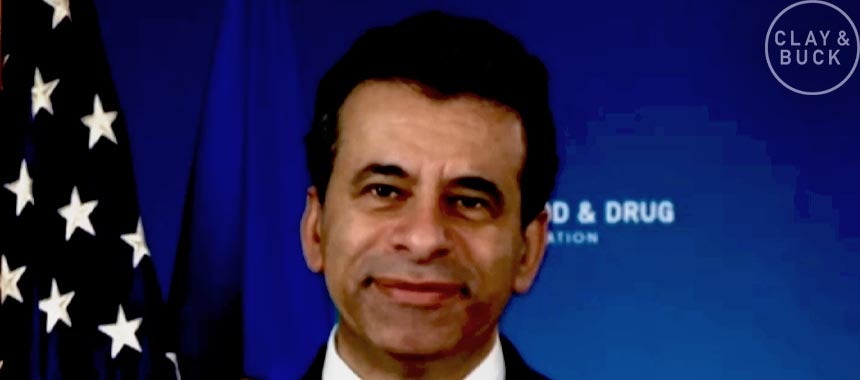Manchin to Vote for KBJ, But GOP Scored Midterm Points
25 Mar 2022
CLAY: Joe Manchin — senator from West Virginia who flirts with the Republicans on a regular basis, the most moderate of all of the Democratic senators — announced this morning that he will be voting for Ketanji Brown Jackson’s nomination on the United States Supreme Court, effectively ending any drama that might surround her ascension to the Supreme Court. So that is basically a done deal, barring some sort of crazy revelation, which it’s hard to imagine what that would entail.
So that will happen in early April. She will replace Judge Stephen Breyer when the court term ends. So I do think that the Republicans scored a lot of points politically, further elucidating the argument for why Republicans in the midterm makes so much sense. But in terms of what is going to happen to her and her nomination, she is effectively on the Supreme Court with that announcement from Joe Manchin. And now the only drama, to the extent that there’s drama at all, will be to what extent will Republicans support her nomination? How many Republicans will she get? Two? Three? Whatever that number is, it doesn’t really matter.
BUCK: What’s your number, Clay?

CLAY: I’m going to go… I think Susan Collins in Maine will end up voting for her. I think there may be a couple of guys who are resigning — “resigning” is the wrong word, who are retiring — from the Senate, who could consider her. I think it’s going to be two. I think there will be two Republicans who end up voting for. What about you?
CLAY: I’ll go four.
BUCK: You think four?
CLAY: Yeah.
CLAY: Yeah. I do think that the drama is that there will be a lot of attention to how, quote, unquote, bipartisan the voting is. But once Manchin came out and said… We talked about this, Buck. There was maybe a small chance that he could use this as an opportunity to announce, effectively, that he’s becoming a Republican. But these are the consequences — and I think they’re fairly significant — of the run-up elections in Georgia.
Because Judge Breyer would not have stepped down, if Republicans had control of the Senate. I really don’t believe that he would have, and there wouldn’t have been any sort of massive pressure campaign on him to step down, meaning that you would continue at 6-3, but with an 80-plus-year-old. And, Buck, if you look — positive news — Clarence Thomas came out of the hospital today. He’s been released. He’s back home, hopefully back to being normal and recovering.
 But when you got people over the age of 70, who are on the Supreme Court, as we saw with Antonin Scalia, at any point, that’s how life works. You might have an unexpected death — and that, by the way, could happen in the Senate as well, where you have a lot of older individuals, politicians, who are representing the Republicans and the Democrats. So there are consequences.
But when you got people over the age of 70, who are on the Supreme Court, as we saw with Antonin Scalia, at any point, that’s how life works. You might have an unexpected death — and that, by the way, could happen in the Senate as well, where you have a lot of older individuals, politicians, who are representing the Republicans and the Democrats. So there are consequences.
BUCK: I also think that the Republicans are not scared of the Democrats the way that we might have anticipated in terms of the backlash against going after Ketanji Brown Jackson.
CLAY: Yeah.
BUCK: I think one of the big takeaways of this whole week of the confirmation hearing is that if the Democrats weren’t in a place where they’re writing think pieces — and they are right now — about how their side is making it too easy — this was in the New York Times, too easy — for a Republicans to just gain ground with independents, to gain ground not just with the Republican base, but with people who will be determining factors in the midterm election and then, of course, going forward to the presidential election after that.
They’re making it easy, in the sense, that they’re failing on so many levels. Their poll numbers are terrible. Biden looks like an absurdity with each passing day. More like an absurdity with each passing day. So the usual, “Oh, I can’t ask tough questions of this, the first” soon to be, I think, the first “black female Supreme Court justice.” Republicans were not actually scared to ask questions, even at the expense of being called — unfairly — racist by the Democrat media, or sexist. Both, obviously.
And I think that’s just indicative of they aren’t really worried about what the Democrat Party is at right now. They don’t feel like people who are persuadable will see asking real questions and being willing to push back a bit on what was supposed to just a glide-through process here of a confirmation. GOP is feeling they can actually push a bit, and I think honestly, it was more than I expected to see this week.
CLAY: Yeah.
BUCK: It was a number of levels. It was obviously the Marsha Blackburn over the question of, “What is a woman?” Speaking of think pieces, I sent this to you. Do you see now? This is a USA Today think piece, as much as you can call it that, and it’s amazing. “Health and wellness,” under USA Today: “Marsha Blackburn asked Ketanji Brown Jackson to define woman. Science says there’s no simple answer.” (laughing) Okay. Sure.
In the 13th hour of Judge Ketanji Brown Jackson’s confirmation hearing, Sen. Marsha Blackburn asked: “Can you provide a definition for the word ‘woman’?” https://t.co/Ikgkqxj83h
— USA TODAY (@USATODAY) March 24, 2022
CLAY: I’m going to disagree with that opinion piece. I do think you’re right, and I think this is consequential. Once you acknowledge that you’re 100% not going to get honest treatment from the media, I think that’s liberating in some way to say exactly what you think as a politician. Because when you know that the Washington Post editorial board is going to come out and say, “Judge Ketanji Brown Jackson was treated worse than Judge Brett Kavanaugh in the hearings,” there’s no point of even arguing otherwise.
This is an unpersuadable, dogmatic, propagandist organization that has been created. And I do think that’s an important point, because so many people are so afraid of Twitter, and they’re so afraid and worried about whether they’re liked or not, that it leads to — even force politicians, certainly for high-powered executives and people in positions of power, many people — afraid to say what they actually think, for fear of what the reaction will be.
And the media has so given up any notions of fair play, that I don’t think Republicans fear what the Washington Post is going to say or what the New York Times is going to say. And in many ways, they recognize that those attacks that they’re going to get for doing their jobs just serves to further buttress the overall support that is out there. That’s why I always say, Buck, “I don’t care if people come after us for things that we say on the show, because the people that attack us, just make people that like us, like us more,” and that is the world we’re in right now.
BUCK: I also think that the base of the Republican Party… I have a number of people who are friends of mine, who are very much, I think in line with the base and they will often send them to me and say, “What’s the point of the GOP?” That’s the point of frustration. Why do we even do this if they will cave on the following? I feel like this week, the GOP decided, all right. They have the votes, but we know what the Democrats would do.
They would make this a real confirmation process. They would ask questions that might rattle this soon-to-be Supreme Court nominee and would at least show the public that you do have — as Tom Cotton pointed out, by the way — a far-left activist. That’s actually what he said. Senator Tom Cotton decided that he was just going to say it, Clay. He didn’t care that the media would attack him.
Judge Jackson has been a far-left activist for decades.
Her years as a judge haven’t changed that. pic.twitter.com/Sati40WeSy
— Tom Cotton (@SenTomCotton) March 24, 2022
BUCK: I think it’s good that the American people know something about who the Supreme Court justice is, other than some of the obvious characteristics and background and resume, which is how Biden picked in the first place.
CLAY: I think also, Buck, the accusations of racism and sexism, don’t land anymore. Because when you brand everything as racist and sexist, it doesn’t work. And let’s be honest. If you really want to talk about direct racism, Joe Biden saying, “I’m picking a black woman,” and specifying during the political campaign that he was going to pick a black woman, thereby eliminating 94%of the American population before it consideration for this particular job, is the very foundation of racism.
And you’re making a choice entirely based on race, which is in its essence, racism, and the American public disagreed, I believe. And I think this deserved to be argued even more, maybe the Republicans did. That takes away from the legitimacy of Ketanji Brown Jackson’s ultimate appointment to the Supreme Court. Because if Joe Biden had done what Donald Trump had did and put out a list of 20 judges that he was considering and said, “These people are all worthy of the Supreme Court. I’m going to pick someone off of this list,” and then he had picked Ketanji Brown Jackson as one of those 20, people wouldn’t have said, “The only reason he picked her was because she was a woman and she was black.”
BUCK: Right.
CLAY: But when you said, “I’m going to put a black woman on,” you automatically undercut the legitimacy of your own choice.
BUCK: And there’s a reason he did this. It was because that was what was best for Joe Biden, because he was trying to get help from the African-American community, during the primary from Democrat voters, and he made it an explicit quid pro quo essentially, going, “Hey, I’ll do this. Give me more votes,” and also wanted it to make it clear that he is taking credit for this, in advance of doing it, right?
If you just did it, Clay. Then afterwards, “Well, of course, yeah. I’m the president who appointed the first black female Supreme Court justice. ” But the whole time, it’s been, “Oh, we know we can count on Joe because the moment that he gets the opportunity…” So he wanted to cash on it early. It was all about what was best for Joe Biden was the point. Because if it was what was best for the process, but honestly for Ketanji Brown Jackson, he would have done exactly what she said, lay out who the varsity team is, so to speak and then pick the all-star. Then pick the person who he thinks is the best. Instead, he narrowed it down to — we’ve done the math — 3% of the population overall, not the legal profession.
CLAY: Yeah, 6% of the overall pongs are black women. And then, Buck, I think it’s 1.8% of attorneys are black women. So meaning — you know, I’m doing the live math on the air, which everybody knows is tough — 98.2% of all attorneys were not considered for this seat, which is pretty wild to think about — and, look, that’s self-evident. Because he only had three or four people to even interview, right? There are only three or four people who were judges that were on the level that could even be considered for the Supreme Court.
 BUCK: Do you agree, by the way? Do you think that affirmative action, as a general… This is not specifically affirmative action. Although, there are obviously discussions as it relates to affirmative action. Do you just it will get struck down —
BUCK: Do you agree, by the way? Do you think that affirmative action, as a general… This is not specifically affirmative action. Although, there are obviously discussions as it relates to affirmative action. Do you just it will get struck down —
CLAY: Yeah. I do.
BUCK: — in June, the next cycle? I think it’s — which will be a fascinating way that that plays out across the country. Depends on obviously the breadth of the decision. And whether we’re right or not, but that will be interesting.
CLAY: I think that will. And then there will be an immediate attempt from all these woke corporations and universities to, again, define “affirmative action,” effectively in some way, that doesn’t quite fit the criteria that has been struck down by the Supreme Court. When that was the reality.
BUCK: I remember when I was an undergrad at Amherst College, the president of the school at the time held a forum. He was properly named. His name was Marx. Oh, yeah. Well-named. So he held a forum on affirmative action and he let the student body know, this was Grutter v. Bollinger, when it looked like the first time around it might — he said, basically, “Don’t worry. Whatever the Supreme Court does, we’re still going to give certain minorities benefits from the application process, and just find a way to cover it up.” He was open. He was pretty open about it at the time.
CLAY: Yeah. I think that’s likely to occur, no matter what, even if the Supreme Court strikes it down.
BUCK: It would be fun to be like, “It’s illegal, everybody, to do this stuff.”
CLAY: Yeah. And, by the way, vast majorities of people of all different races now disagree with the concept of affirmative action as the way it’s being implemented today. So this is not something that is popular in any way. But big picture, as we roll into the weekend, after the biggest, I would say, most significant news coming out of Washington, in terms of political news: Ketanji Brown Jackson is going to be elevated to the Supreme Court early in April. She will be confirmed, and then she will take over when Justice Breyer steps down.
BUCK: More left-wing than Sotomayor from the bench, or about the same?
 CLAY: Honestly, this is one of those things where she’s been such a stealth candidate, it’s hard to even get a great read on what her opinions are going to be. Certainly, more left-wing than Breyer, who could be at times very conciliatory in terms of the way that he felt his job as a justice existed. Breyer was at least cognizant in some way of business. I don’t think Ketanji Brown Jackson will. I think she won’t be as left wing as Sotomayor. I think she’ll be somewhere to the left of Sotomayor, closer to Kagan.
CLAY: Honestly, this is one of those things where she’s been such a stealth candidate, it’s hard to even get a great read on what her opinions are going to be. Certainly, more left-wing than Breyer, who could be at times very conciliatory in terms of the way that he felt his job as a justice existed. Breyer was at least cognizant in some way of business. I don’t think Ketanji Brown Jackson will. I think she won’t be as left wing as Sotomayor. I think she’ll be somewhere to the left of Sotomayor, closer to Kagan.
BUCK: The old left believed in using the system to achieve power and use power through the system. The new left, just power.
CLAY: Yes.
BUCK: Whatever end state you want, whatever situation can get you there, that’s the way it goes. The law is just kind of an impediment.
Recent Stories

Political Commentator Debra Lea Talks the Mood in Israel and the Deadline for Iran
Just back from Israel and with an eye on Iran, Debra starts by making a point: She's not in the Mossad.

Manufacturing Delusion Is On Sale Now!
Buck's book opens at #4 on the New York Times bestseller list. Get your copy today!

Operation Chaos Lives in Texas! Republicans Voting Crockett?
Rush's Operation Chaos reborn in the Lone Star state!

Brendan Carr Explains the FCC Public Notice on Sports Broadcasting
The FCC commissioner wants to make sports easier to watch.

The Great Dr. Marty Makary on All the Ways the FDA is Making America Healthier
FDA Commissioner, Dr. Marty Makary, joins Clay and Buck with a far-reaching, exciting MAHA update.





